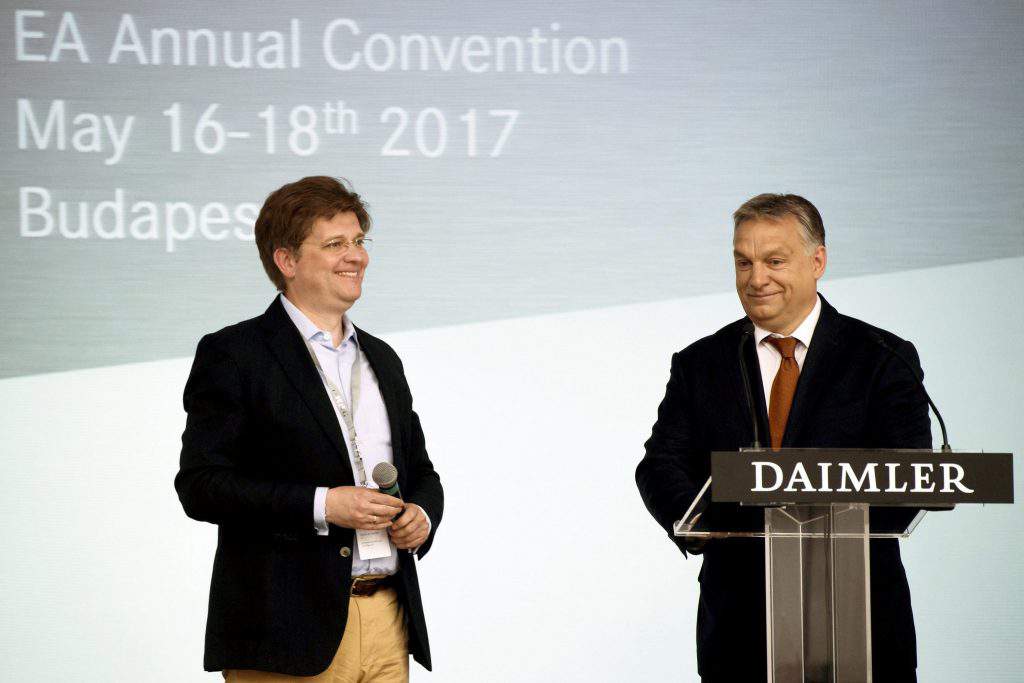Orbán: Mercedes plant symbol of trust placed in Hungary

Budapest, May 18 (MTI) – German carmaker Mercedes’ plant in Kecskemét, in central Hungary, is a symbol of the trust the company has in Hungary, Prime Minister Viktor Orbán said at a general assembly meeting of Mercedes parent company Daimler in Budapest on Thursday.
The prime minister said the plant had been built during the financial crisis, back when investments “weren’t being thrown around in Europe”. Orbán said that back then, Hungary had been in worse shape financially than Greece. In this difficult time, Mercedes’ decision to invest in Hungary was more than just a financial one: it demonstrated that Mercedes believed in Hungary’s future, he added.
Orbán expressed hope that the company had not regretted the investment, saying that “the numbers look quite good” and the 1.3 billion euros invested in the Kecskemét base had been worth it.
He said Mercedes was one of the reasons the Hungarian economy was on an upward trajectory.
Orbán described Hungary’s 4.1 percent first-quarter GDP growth rate as “not bad” compared with other EU member states, saying that it had surprised analysts. He added, however, that he was not satisfied with the data, as Hungary will need to reach even higher growth levels.
The prime minister said shaming Hungary was “foolish”, arguing that the country currently has the highest or second highest growth rate in the European Union. Hungary has the fastest-declining unemployment rate in the EU; it complies with all European financial regulations and its public debt is decreasing, Orbán said.
He said it was time to concede that Europe’s economy could not be strong without successful European national economies.
The 2008-2009 financial crisis was not about economic cycles but a structural crisis and a crisis of competitiveness, therefore the response should be given in the latter dimension, he said.
Orbán said two key components needed to guarantee Europe’s competitiveness — a successful Germany and successful central Europe — were already in place. “A reformed France and an Italy with strong political leadership are still needed,” he added.
He said it would be important for Britain’s divorce talks with the EU to end in a “win-win situation”, adding, however, that the current state of negotiations pointed to “lose-lose”.
The prime minister stressed the importance of a “strong and secure Europe full of self-confidence”, saying that this was also in the interest of Mercedes.
The individual performance of member states is a precondition for the performance of the international companies originating from those states, he said. Therefore the debate about the future of the EU is just as important to Daimler as it is to member states, Orbán argued.

He called Hungary an “unwavering” member of the EU, adding that “its fate is connected” with the development of the bloc. He said that at present the earlier unquestionable competitiveness of the EU was in danger and was losing both economic and demographic weight.
In order for Europe to regain its competitiveness, the bloc should allow member states to pursue their own economic policies within a jointly approved set of rules, Orbán said, adding that it would be wrong for member states to have to transfer more powers to the bloc.
He said it was important to have a proper understanding of “the new industrial revolution”. He said Germany’s “Industrie 4.0” strategy would only be effective if it is coupled with low taxes and cheap energy. He argued that Europe should work closely together with regions capable of providing cheap sources of energy for the continent, rather than “cutting ourselves off” from these countries.
The prime minister underlined the importance of spending on innovation, arguing that this was an area in which Europe could enjoy a competitive advantage over the rest of the world. He also highlighted the importance of new forms of cooperation with developing countries such as China, India and Russia and Europe’s participation in the creation of new trade routes.
Orbán said member states’ tax systems should be tailored to the given country’s characteristics and should also take into consideration the local work culture and historical background. He said Hungary had made the right call when rejecting the “one size fits all” recommendations of the IMF, the European Central Bank and the European Commission, “otherwise we would have ended up like Greece”, which had followed their instructions.
Orbán said the primary reason why Hungary was an advantageous country to invest in was because of its political stability, arguing that it was now one of the EU’s most politically stable countries. Hungary can guarantee a disciplined and rational fiscal policy, he said, noting that last year Hungary’s budget deficit had been 1.7 percent of GDP. He vowed that this year’s deficit would also be significantly below 3 percent. Hungary could even register a budget surplus for the whole year, he said, but added that the government must support investments, encourage growth and manage the deficit all at the same time.
Photo: MTI
Source: MTI





